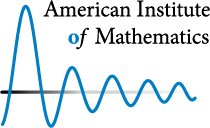
at the
American Institute of Mathematics, Palo Alto, California
organized by
Drew Armstrong, Stephen Griffeth, Victor Reiner, and Monica Vazirani
This workshop, sponsored by AIM and the NSF, will be devoted to understanding the interaction between new developments in algebra and combinatorics. In particular, it will focus on combinatorial objects counted by generalizations of Catalan numbers and their interaction with the representation theory of Cherednik algebras.
To each finite group generated by reflections (either real or pseudo-reflections) there is associated a family of generalizations of the classical Catalan numbers. These numbers have shown up in the study of: noncrossing partitions and braid groups; quotients of the root lattice and diagonal harmonics; Shi hyperplane arrangements and affine Weyl gruoups; and in cluster algebras and tropical geometry. The occurrence of the same numerology in different subjects suggests that there may be a deeper connection. There has been recent progress in connecting certain elements of this story, but a general encompassing framework is still missing.
Cherednik introduced the double affine Hecke algebra in the 1990s to solve Macdonald's constant term conjecture, and the more general "Cherednik algebras" have been quite influential. More recently, the generalized Catalan numbers mentioned above have appeared as Hilbert series for certain representations of "rational" Cherednik algebras, and their appearance in this context is uniform (i.e. it avoids Cartan-Killing type classification). Because the theory of Cherednik algebras is broad, powerful, and flexible, there is hope that it will provide a suitable unifying framework for Catalan combinatorics.
The cultures of Catalan combinatorics and Cherednik algebras are at present fairly disjoint. One of the purposes of this workshop is to bring the two cultures together with the hope that major breakthroughs will result.
The main goals of the workshop are:
The workshop will differ from typical conferences in some regards. Participants will be invited to suggest open problems and questions before the workshop begins, and these will be posted on the workshop website. These include specific problems on which there is hope of making some progress during the workshop, as well as more ambitious problems which may influence the future activity of the field. Lectures at the workshop will be focused on familiarizing the participants with the background material leading up to specific problems, and the schedule will include discussion and parallel working sessions.
The deadline to apply for support to participate in this workshop has passed.
For more information email workshops@aimath.org
Plain text announcement or brief announcement.
Go to the
American Institute of Mathematics.
Go to the
list of upcoming workshops.